讲评Unit 13 The water planet教案
- 格式:doc
- 大小:45.50 KB
- 文档页数:3
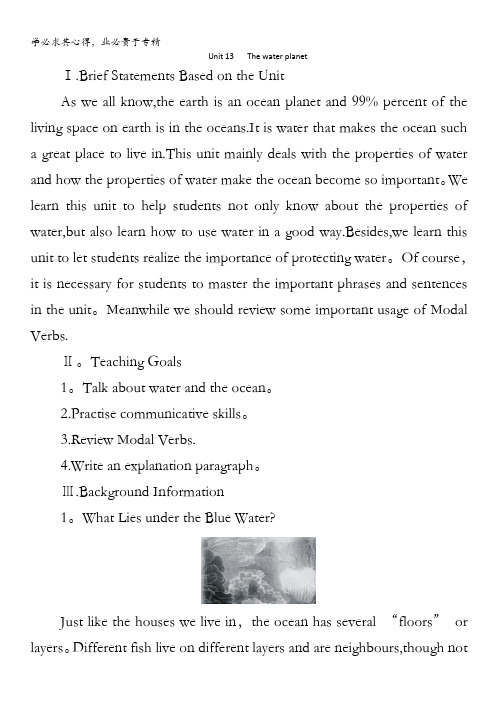
Unit 13 The water planetⅠ.Brief Statements Based on the UnitAs we all know,the earth is an ocean planet and 99% percent of the living space on earth is in the oceans.It is water that makes the ocean such a great place to live in.This unit mainly deals with the properties of water and how the properties of water make the ocean become so important。
We learn this unit to help students not only know about the properties of water,but also learn how to use water in a good way.Besides,we learn this unit to let students realize the importance of protecting water。
Of course,it is necessary for students to master the important phrases and sentences in the unit。
Meanwhile we should review some important usage of Modal Verbs.Ⅱ。
Teaching Goals1。
Talk about water and the ocean。
2.Practise communicative skills。
3.Review Modal Verbs.4.Write an explanation paragraph。

The Second PeriodTeaching Aims:1.Learn and master the following words and phrases:cube,property,range,medium,relatively,dissolve,pure,relationship,mass,float,absorb,bottom,all the way,that is,add…to,mix with,take advantage of,manage to do2.Improve the students’ reading ability.3.Enable the students to realize that it is important to protect the water on our planet.Teaching Important Points:1.Improve the students’ reading ability.2.Master the following phrases:all the way,that is,mix with,take advantage of,manage to doTeaching Difficult Point:How to make the students understand the reading passage better.Teaching Methods:1.Discussion before reading to make the students interested in what they will learn.2.Fast reading to get a general idea of the text.3.Discussion after reading to make students understand what they’ve learned better.4.Careful reading to get the detailed information in the text.Teaching Aids:1.the multimedia2.the blackboardTeaching Procedures:Step ⅠGreetings and Revision(Greet the whole class as usual.)T:Yesterday we learnt something about water.Now who can tell me what you learned yesterday?S1:I learned that water is very important to all the living things on the earth.T:OK,can you give me the reason why it is important?S2:Water can be used to wash clothing,to made electricity,to water the farm and so on.Of course,every day we must drink enough water.So water is very important.T:Anything else?S3:I know something about water.For example,from the experiments we made yesterday,I know vegetable oil can’t be dissolved by water.Step ⅡPre-reading and ReadingT:OK.Thank you for your answers to my questions.As we all know,we can’t live without water.But do you know what makes water so important to all the living things?Ss:No,we don’t know.T:Maybe we can get the answer to the question after reading the article for today.Before you read,first let’s learn the new words and phrases in the passage.(Teacher deals with the new words with the whole class.)T:Now please read the passage quickly to get the general idea and try to use the following structures to make six questions.(Teacher uses multimedia to show the structures on the screen.)(Teacher gives students five minutes to finish the fast reading and making questions.Five minutes later,teacher asks some students to write their questions on the blackboard.)T:Well done.Who can tell me the general idea of the text?S4:The passage mainly tells us it is water that makes the ocean so important to all the living things in the world.T:Good work.Next,let’s read the passage carefully to get more information about water.While you are reading,try to finish the chart in Post-reading on Page 21 and find out the answers to the questions on the blackboard.(Teacher gives students enough time to read the text and collects their information for the chart.)Suggested answers:T:Very good.What about the questions on the blackboard?S5:I think I can answer the first one.The answer is that the properties of water are chemicalstructure,salinity density,heat capacity and ocean motion.S6:In my opinion,the answer to the fourth question is that the ocean can be pared to a great place to live in.T:Do you agree with them?Ss:Yes.T:What about other questions?S7:I think plankton,sharks and whales are examples of species in the ocean.S8:The answer to the second one is that the earth looks like an ocean planet.T:You are quite right.Any volunteers?S9:Dear teacher.Can you tell us the meaning of the special air-conditioner—the ocean?T:Maybe it means that there are some similarities between air-conditioner and the ocean.S9:Thank you.I got it.T:Then,who can answer the question?S10:Because the ocean can keep the temperature of the earth steady,some students pare the ocean to a special air-conditioning.I think the ocean keeps the temperature of the earth steady by absorbing and releasing heat.T:Well done.There is only one question left.Who wants to try?(Nobody answers the question.)T:Do you think it is a question that the text can’t answer?Ss:Yeah.We think so.T:OK.Maybe you are right.But I want to know the reason why you think the passage can’t answer the third question.Ss:Because there is not any information about the different parts of the ocean.T:Then,are there any questions you would need to add to “cover”all the information in the text?S11:I have a question.Why is the water in the ocean always moving?S12:Since changes in salinity and temperature affect water’s density,the water in the ocean isalways moving.Step ⅢFurther Understanding and Language StudyT:Well done.I think you are very familiar with the passage.In the passage there are some words and expressions we should master.Now let’s look at the screen.I will give you some explanations about the words and expressions.(Teacher writes the words,phrases and sentences on the blackboard.)Step ⅣListening and Reading AloudT:Let’s listen to the tape.When I play it for the first time,just listen to it.When I play it for the second time,please listen and repeat.Then read the text aloud.Are you clear about that?Ss:Yes.(Te teacher plays the tape for the students to listen.After listening,the teacher goes among the students and corrects any mistake the students make in pronunciation,stress and intonation.) Step ⅤSummary and HomeworkT:Today,we have read a passage about water.As we know,it is very important to all the living things.So we should do all we can to protect water from being polluted.In addition,try your best to retell the passage in your own words.Is that clear?Ss:Yes.T:See you tomorrow!Ss:See you tomorrow!Step ⅥThe Design of the Writing on the BlackboardStep ⅦRecord after Teaching。
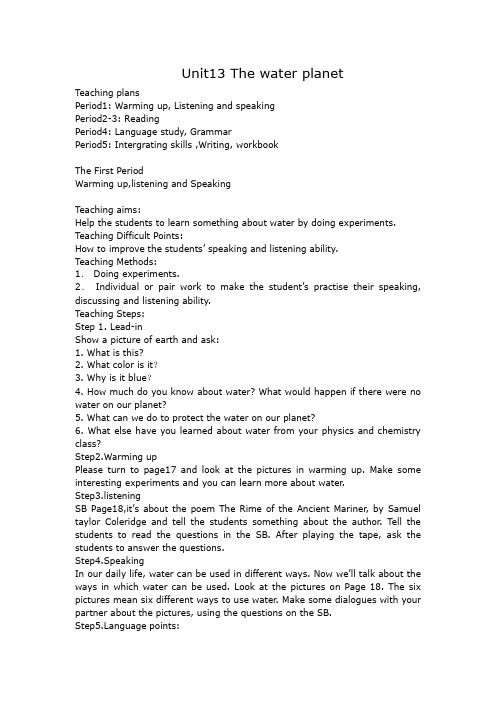
Unit13 The water planetTeaching plansPeriod1: Warming up, Listening and speakingPeriod2-3: ReadingPeriod4: Language study, GrammarPeriod5: Intergrating skills ,Writing, workbookThe First PeriodWarming up,listening and SpeakingTeaching aims:Help the students to learn something about water by doing experiments. Teaching Difficult Points:How to improve the students’ speaking and listening ability.Teaching Methods:1.Doing experiments.2.Individual or pair work to make the student’s practise the ir speaking, discussing and listening ability.Teaching Steps:Step 1. Lead-inShow a picture of earth and ask:1. What is this?2. What color is it?3. Why is it blue?4. How much do you know about water? What would happen if there were no water on our planet?5. What can we do to protect the water on our planet?6. What else have you learned about water from your physics and chemistry class?Step2.Warming upPlease turn to page17 and look at the pictures in warming up. Make some interesting experiments and you can learn more about water.Step3.listeningSB Page18,it’s about the poem The Rime of the Ancient Mariner, by Samuel taylor Coleridge and tell the students something about the author. Tell the students to read the questions in the SB. After playing the tape, ask the students to answer the questions.Step4.SpeakingIn our daily life, water can be used in different ways. Now we’ll talk about the ways in which water can be used. Look at the pictures on Page 18. The six pictures mean six different ways to use water. Make some dialogues with your partner about the pictures, using the questions on the SB.nguage points:benefit vt.使……受益,对……有利(常和from连用,有时和by连用)Who stands to benefit most by the new tax laws?什么人可能从新的税法中得到最大的好处?He has’t benefited from the experience.他虽有体验却无长进。
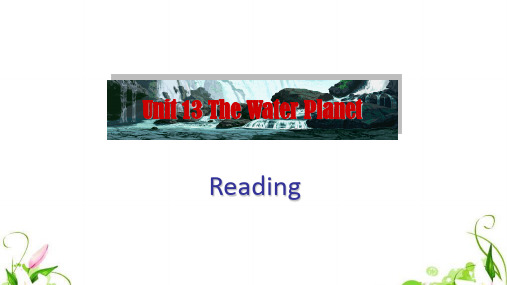
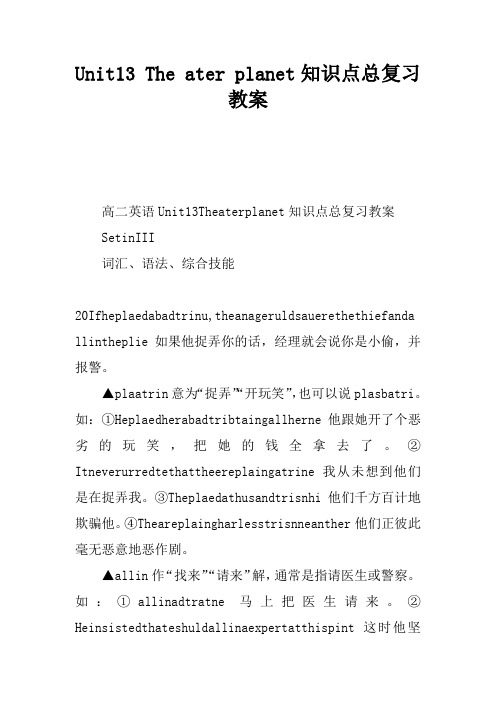
Unit13 The ater planet知识点总复习教案高二英语Unit13Theaterplanet知识点总复习教案SetinIII词汇、语法、综合技能20Ifheplaedabadtrinu,theanageruldsauerethethiefanda llintheplie如果他捉弄你的话,经理就会说你是小偷,并报警。
“开玩笑”,也可以说plasbatri。
▲plaatrin意为“捉弄”如:①Heplaedherabadtribtaingallherne他跟她开了个恶劣的玩笑,把她的钱全拿去了。
②Itneverurredtethattheereplaingatrine我从未想到他们是在捉弄我。
③Theplaedathusandtrisnhi他们千方百计地欺骗他。
④Theareplaingharlesstrisnneanther他们正彼此毫无恶意地恶作剧。
▲allin作“找来”“请来”解,通常是指请医生或警察。
如:①allinadtratne马上把医生请来。
②Heinsistedthateshuldallinaexpertatthispint这时他坚决主张我们去请一位专家来。
▲allin可作“来访”“到……那里去”解。
如:①Healledinandtldusthattheahinehadbeenbadldaaged他来告诉我们机器受到了严重损坏。
②Ifredthehabitfallinginntheintheevenings我每天晚上都到他们那里去,这已形成了习惯。
▲allin还有“收回”之意。
如:Thelibrarianshasalledinallthebs图书馆管理员把书都收回去了。
【注】allin作“来访”解时,可看作不及物动词,如表示“访问某人”,要说allinnsb。
如:①ulduallinnunurahe?你能不能在回家的路上看看妈妈?②Igtintthehabitfallinginnthebstrenahe我在回家的路上总要去书店看看,这已成了习惯。
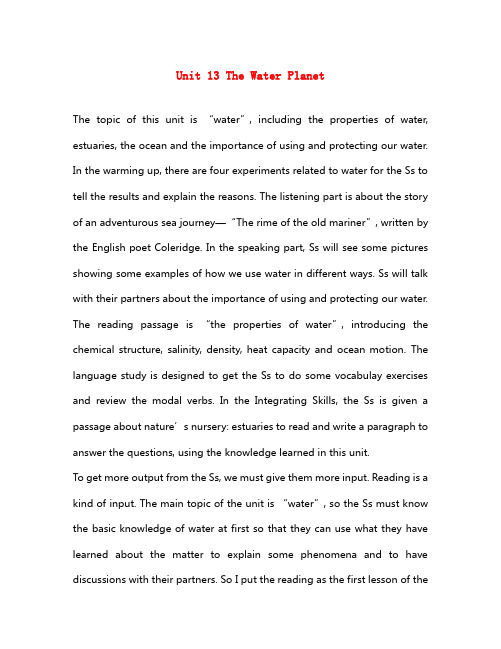
Unit 13 The Water PlanetThe topic of this unit is “water”, including the properties of water, estuaries, the ocean and the importance of using and protecting our water. In the warming up, there are four experiments related to water for the Ss to tell the results and explain the reasons. The listening part is about the story of an adventurous sea journey—“The rime of the old mariner”, written by the English poet Coleridge. In the speaking part, Ss will see some pictures showing some examples of how we use water in different ways. Ss will talk with their partners about the importance of using and protecting our water. The reading passage is “the properties of water”, introducing the chemical structure, salinity, density, heat capacity and ocean motion. The language study is designed to get the Ss to do some vocabulay exercises and review the modal verbs. In the Integrating Skills, the Ss is given a passage about nature’s nursery: estuaries to read and write a paragraph to answer the questions, using the knowledge learned in this unit.To get more output from the Ss, we must give them more input. Reading is a kind of input. The main topic of the unit is “water”, so the Ss must know the basic knowledge of water at first so that they can use what they have learned about the matter to explain some phenomena and to have discussions with their partners. So I put the reading as the first lesson of theUnit and have the warming up activity as one of the reading activities to check the Ss’ understanding of the reading passage. The second period is a kind of output, that is to have discussions about the using and protecting of water; while the third period is about the tale or story about water and the fourth period the protection of oceans.Period 1 ReadingGoals1. Provide the Ss with the opportunity to know about the water planet and the properties of water.2. Help the Ss explain some phenomena using the knowledge they learned from the reading material.3. Help the Ss know the importance of water to human beings and the planet.4. Improve the Ss’ability of reading comprehension.ProceduresStep 1. Leading inShow the Ss the picture of “the water planet” and ask:What’s this?/ What color is it?/ Why is it blue?Then ask:1.What else have you learned about water and the water planet?2.what would happen if there were no water on our planet?3.Do you know any properties of water?Purpose: 1. get the Ss to know the topic of this unit—water and the water planet.2. Arouse the Ss interest of learning the properties of water.Step 2. ScanningGet the Ss to scan the passage to know what properties of water are mentioned in the reading passage. (Explain some words of the properties if necessary.)Purpose: To get the Ss to know the properties of water and train their ability to scan a passage.Step 3. SkimmingGet the Ss to read the passage carefully and complete the chart below.Purpose: To get the Ss to know the details of the properties of water andtrain their ability of skimming.Step 4. ExperimentsGet the Ss to do the following experiments that will illustrate some of the key properties of water. Ask them to examine them carefully and explain what happens and why, using the information from the reading material. Experiment 1: Pour water and vegetable oil into a glass. What happens? why?Experiment 2: Fill one glass with fresh water and another glass with salt water. Put an ice cube in each glass. What happens? Why?Experiment 3: put a piece of chalk in water for 24 hours. What happens? Why?Then show them two pictures of people who are floating on the surface of Dead Sea. Ask them to explain how they can do this.Purpose: To help the Ss use what they have learned from the reading passage to explain some phenomena.Step 5. ConcludingAsk:Why must we learn about the properties of water?Purpose: To draw a conclusion of the reading passage and get the Ss to know the importance of using and protecting water and raise their awareness of water protection.Period 2 SpeakingGoals: 1. Talk about using and protecting water.2. Practise making suggestions and expressing opinions.Step 1. SpeakingShow the Ss some pictures that show some examples of how we use water in different ways—electricity, agriculture, home use, industry, transport and entertainment. Ss will talk with their partners about the importance of using and protecting our water.Provide them with the following questions and the useful expressions to make suggestions and express opinions.Questions:1.How is the water being used in …?2.Why do we use water in this way?3.Is it a good way to use water?4.Who benefits from using water in this way?5.What are the disadvantages if doing so?6.Can you think of a better way to solve the problem?7.What will we do if …?Useful expressions:The water being used to/for…We should/could …What will we do if …?If we …, we can …It would be better to …Can you think of a better way to …Purpose: To talk about using and protecting water and practise asking suggestions and expressing opinions at the same time.Step 2. Making a posterGet the Ss to design a poster to show people the importance of using and protecting our water planet!Purpose: To raise the Ss’ awareness of environmental protection.Period 4 ListeningGoals: 1. Develop the Ss’ listening abilities.2. Get them to listen to the poem by Coleridge—The Rime of the Old MarinerStep 1 IntroductionIntroduce Coleridge to the Ss.Purpose: To give the Ss a chance to know some background knowledge about the poet and the poem they are to listen about.Step 2 ListeningPlay the tape for the Ss to listen and answer the questions on the textbook. Part 11.Who tells the story in the poem?2.What does one of the sailors do?3.What do you think will happen next?4.Why are the sailors frightened?Part 21. What happens to the sailors?2. What happens to the mariner? Why?3. Why is the person telling the story?Purpose: To improve the Ss’ listening abilities.Step 3 Story-tellingGet the Ss to tell the story listened from the tape( show them some pictures at the same time)Purpose: To enable the Ss to retell the story, using their own language, to improve their abilities of thinking in English.Step 4 Story-makingThere are many poems about the ocean and the life of sailors and fishermen. Get the Ss to work in groups and see whether they can find another poem or story like this.If not, ask them to make up a good, scary story like the one about the mariner?Purpose: To improve the Ss’ abilities of language organizing.Period 5 Integrating SkillsStep 1. ReadingA. Fast readingGet the Ss to read the passage quickly to find the topic sentence of each paragraph and tell the structure of the passage.B. Intensive readingGet the Ss to read the passage carefully and answer the following questions.1.W h y a r e e s t u a r i e s s u c h g o o d p l a c e s f o r n a t u r e's y o u n g o n e s?2.W h a t d o e s d e n s i t y m e a n i n t h i s p a s s a g e?3.H o w d o e s t u a r i e s a f f e c t t h e w a t e r t h a t p a s s e s t h r o u g h t h e m?4.W h y a r e e s t u a r i e s m o r e s e n s i t i v e t o p o l l u t i o n t h a n o t h e r a r e a s?5.W h y a r e e s t u a r i e s i m p o r t a n t t o h u m a n b e i n g s?C. Word studyG e t t h e S s t o m a t c h t h e n e w w o r d s a n d t h e i r m e a n i n g s.P u r p o s e:T o t r a i n t h e S s’a b i l i t i e s o f r e a d i n g c o m p r e h e n s i o n a n d k n o w t h e s t r u c t u r e o f t h e p a s s a g e.Step 2 Project—Caring for the living thins in the oceansShow the Ss some pictures of ocean pollution and get the Ss to summarize the problems the living things in the oceans are facing. Give them the following questions for reference.1.What’ the problem with life in the oceans?2.What has caused the problem?3.What’s the relationship between human beings and the oceans?4.What can we do to protect the sea?Organize the Ss to write the passage according to the following writing activities.Pre-writing1. Look through the given information carefully and get a general idea about what to write.2. Write out / draw up an outline. Generally speaking, some key words, key expressions or key sentences.(Remember to cover all the key points. )3. Decide which verb tense/tenses you are to use.While-writingWhen you are working on your writing, pay attention to your handwriting, meanwhile, polish each sentence by using good expressions and structures, making sure what you’ve written is logical.How to polish your writingBy using with structureBy using inversion structureBy using doing/doneBy using compound sentenceBy using set phrases and sentence structuresBy using proper conjunctions and adverbsPost-writingCheck the whole passage to make sure that there are no mistakes. (Look out for silly mistakes, which can spoil your writing.)Purpose: To raise the Ss’awareness of environmental protection and develop the Ss’ writing abilities..。
Unit13Thewaterplanet知识点总复习教案高二英语Unit13Theaterplanet知识点总复习教案SectionIII词汇、语法、综合技能0.Ifheplayedabadtriconyou,theanagerouldsayyouerethe thiefandcallinthepolice.如果他捉弄你的话,经理就会说你是小偷,并报警。
▲playatricon意为“捉弄”“开玩笑”,也可以说playsb.atric。
如:①Heplayedherabadtricbytaingallheroney.他跟她开了个恶劣的玩笑,把她的钱全拿去了。
②Itneveroccurredtoethattheyereplayingatricone.我从未想到他们是在捉弄我。
③Theyplayedathousandtricsonhi.他们千方百计地欺骗他。
④Theyareplayingharlesstricsononeanother.他们正彼此毫无恶意地恶作剧。
▲callin作“找来”“请来”解,通常是指请医生或警察。
如:①callinadoctoratonce.马上把医生请来。
②Heinsistedthateshouldcallinaexpertatthispoint.这时他坚决主张我们去请一位专家来。
▲callin可作“来访”“到……那里去”解。
如:①Hecalledinandtoldusthattheachinehadbeenbadlydaaged.他来告诉我们机器受到了严重损坏。
②Iforedthehabitofcallinginontheintheevenings.我每天晚上都到他们那里去,这已形成了习惯。
▲callin还有“收回”之意。
如:Thelibrarianshascalledinalltheboos.图书馆管理员把书都收回去了。
【注】callin作“来访”解时,可看作不及物动词,如表示“访问某人”,要说callinonsb.。
高二英语Unit13Thewaterplanet知识点总复习教案Lesson plan of unit 13 the waterplane高二英语Unit13Thewaterplanet知识点总复习教案前言:小泰温馨提醒,英语作为在许多国际组织或者会议上都是必需语言,几乎所有学校选择英语作为其主要或唯一的外语必修课。
英语教学涉及多种专业理论知识,包括语言学、第二语言习得、词汇学、句法学、文体学、语料库理论、认知心理学等内容。
本教案根据英语课程标准的要求和针对教学对象是高中生群体的特点,将教学诸要素有序安排,确定合适的教学方案的设想和计划、并以启迪发展学生智力为根本目的。
便于学习和使用,本文下载后内容可随意修改调整及打印。
高二英语unit13 the water planet知识点总复习教案section i 课前准备、听力、口语1.practise making suggestions and expressing opinions. 练习提出建议并发表观点。
(p. 17 goals2)▲ practise vt. 练习practise后面的动词一般要用-ing形式。
类似practise这种接动词-ing形式作宾语的动词还有:finish, enjoy, mind, give up, can't help, suggest, keep等。
如:① i practise playing the piano every day. 我每天练习弹钢琴。
② she had finished writing the letter when i went in. 我进去时她已写完信了。
③he enjoys skating very much. 他非常喜欢溜冰。
④ do you mind closi ng the window? 请你把窗户关上好吗?⑤ mary couldn't help laughing at tom's joke. 对于tom的玩笑,mary忍不住笑了。
Unit13 The water planet知识点总复习教案高二英语Unit13 The water planet知识点总复习教案III 词汇、语法、综合技能20. If he played a badu, the manager would say you wand calllice. 如果他捉弄你的话,经理就会说你是小偷,并报警。
(p.22 Ex.2 倒数3-2行)▲play a意为“捉弄”“开玩笑”,也可以说play sb. a trick。
如:① He played her a bad trick by taking all他跟她开了个恶劣的玩笑,把她的钱全拿去了。
② It never occurredat they were pl aying a我从未想到他们是在捉弄我。
③ They played a thousand 他们千方百计地欺骗他。
④ They are playing harmla他们正彼此毫无恶意地恶作剧。
▲call in作“找来”“请来”解,通常是指请医生或警察。
如:① Call in a doctor a马上把医生请来。
② Hd that we should call in a expert a这时他坚决主张我们去请一位专家来。
▲call in可作“来访”“到……那里去”解。
如:① He ca lled in and told us that the machine had been badly damaged.他来告诉我们机器受到了严重损坏。
② I formed the habit of callingvenings.我每天晚上都到他们那里去,这已形成了习惯。
▲ call in还有“收回”之意。
如:Thelibrarians has called in all the books.图书馆管理员把书都收回去了。
【注】call in作“来访”解时,可看作不及物动词,如表示“访问某人”,要说callb.。
The Third PeriodTeaching Aims:1.Review Modal Verbs.2.Do some exercises to review some important words learnt in the last period.Teaching Important Point:Review Modal Verbs.Teaching Difficult Point:How to help the students correctly use the Modal Verbs.Teaching Methods:1.Review method to help the students remember all the Modal Verbs they have learnt before and use them correctly.2.Individual work or group work to make every student work in class.Teaching Aids:1.the multimedia2.the blackboardTeaching Procedures:Step ⅠGreetings and Revision(Greet the whole class as usual.)T:Yesterday we learned a passage about water and now who can retell the passage in your own words?S1:Let me try.…T:Well done.Thank you for your performance.Step ⅡWord StudyT:Now please turn to Page 21.Look at the first part of Word Study.There are some words learnt in the last period,but the letters of these words are in the wrong order.Now I will give you afew minutes to put the letters in the correct order.(A few minutes later,teacher may ask some students to spell their answers and give the Chinese meaning of each word to all the students.Finally teacher writes the correct words on the blackboard.)T:Good work.Next look at the screen and try to plete the following sentences by filling in the blanks with the proper words.The first letter has been given and some words can be used more than once.If you need,you can have a discussion with your partner.(Teacher uses the multimedia to show the following sentences on the screen.)(Teacher gives students enough time to prepare and then check their answers.)Suggested answers:1.hydrogen,oxygen2.liquid,solid,gas3.atom4.steady,absorbStep ⅢGrammarT:Up to now we have learnt many modal verbs.Who can tell me what they are?Ss:…(Teacher asks some students to write their answers on the blackboard.)Modal Verbs:can/could,may/might,will/would,be able to,must,should,have to,need,shall,ought to,had better.T:Very good.Then do you know how to use them?S2:I know “should”can be used to give others some advice.S3:I know when I want to borrow a book from my friend,I can use “may”.…’s look at it.(Teacher uses the multimedia to show the conclusion on the screen.)T:From the chart we can see modal verbs can be classfied into eight groups by their usages.Are you clear about the classification?Ss:Yes.T:OK.Now look at the first part in Grammar.Finish the exercises according to the class fication of modal verbs.If you need,you can discuss with your partner.In addition you’d better make it clear why you choose A、B、C,or D.Are you clear about the requirements?Ss:Yes.(Teacher gives students enough time to finish the exercises.Then deals with them with the whole class.)T:Are you ready?Ss:Yes.’d like to tell me the answer to the first one?S4:I think “A”is right.T:Can you tell us the reason why you choose “A”?S4:Because the speaker wants to express his/her request.Among A、B、C and D,only A can be used to express request.T:Very good.What about the second one?S5:“May”is right,I think,because the sentence is used to ask for permission.T:Congratulations!Who can answer the third one?S6:The phrase “wants to”express a state of being necessity.So I think “C”is right.’s turn to do the fourth one.Who can try?S7:I’m not sure,but I want to have a try.Is “C”right?T:Why did you choose “C”?S8:I think the first sentence expresses some necessity and the second one expresses guess.S9:I don’t think so.Because “must”can’t be used in negative sentences to express guess.S8:Oh,I’m sorry.I forgot it.I see,the correct answer is “D”.T:Excellent!…(Teacher encourages students to show their opinions about each one,and then teacher gives the correct answers and some necessary explanations.)Suggested answers:T:You have finished the first part successfully.Now let’s go on with the second part.Do you have confidence to finish it?Ss:Yes.Of course we have.T:OK.This is a letter from Mary to John.Maybe John met some problems,so Mary wants to write a letter to help him.But Mary doesn’t know how to use the modal verbs correctly.She wants you to help her finish the letter.Before you finish the letter,read it to get the general idea of it first and then answer the questions on the screen.(Teacher uses multimedia to show the questions on the screen.)(Teacher gives students a few minutes to read the letter,and then checks their answers to the questions.)T:Who’d like to answer the first question?S10:I want to have a try.In my opinion,John’s problem is that his manager suspected him of stealing something at the meat factory.T:Well done.Do you agree with him?Ss:Yes.T:What about the second one?S11:I’d like to answer the question.I don’t agree to the advice that Mary gives to him.Because if he finds another job,maybe it means that he really stole something at the meat factory.I think he should tell the manager that he didn’t do it and advise the manager to call in the police to make it clear.S12:In my opinion,he’d better try to find out who is the real thief to prove that he didn’t do anything wrong.…T:I think your suggestions are all very helpful to John and I hope he can find a good way to deal with the problem.Now you are clear about John’’s your turn to help Mary finish the letter.Maybe there are more than one answer for some blanks.If you have some difficulties,you can discuss with your partner.Five minutes later,I will check your answers.Suggested answers:can/will/should,maynot/mightnot,must,could/should,might/would,will,might/may/could/would,might,would/could/might,should, willStep ⅣSummary and HomeworkT:Today,we’’s all for today.See you tomorrow.Ss:See you tomorrow.Step ⅤThe Design of the Writing on theBlackboardStep ⅥRecord after Teaching。
讲评Unit 13 The water planet教案 一、教学目标: 1、知识目标:主谓一致、动词短语、情态动词、被动语态、词汇、介词短语、非谓语动词 2、能力目标:教授学生做单项选择题和完形填空的方法 3、情感目标:通过对完形填空题的理解,使学生热爱地球,保护环境 二、重难点: 1、词汇及短语的使用 2、情态动词的用法 3、做完形填空的方法 三、教学方法及手段: 以学生讨论为主,通过自学,教师讲解的方式,教会学生做题的方法,并锻炼学生的表达自我的能力。 Teaching procedure: 1、Ask students to discuss into groups and then talk about their opinions 一. 单项选择 1. It was reported that _____ of the people at the meeting. A. three-fifths; were B. third-fifths; was C. three-fives; are D. three-fifth; were 2. There are 75 students in our class, with their ages _____. A. range from 14 to 18 B. ranging between 14 and 18 C. ranged from 14 to 18 D. ranging both 14 and 18 3. The new airport _____ if they had not stopped working on it. A. would complete B. had been completed C. had completed D. would have been completed 4. You _____ return the book now. You can keep it till next week if you like. A. can’t B. mustn’t C. needn’t D. may not 5. I took _____ of the fine weather today to play tennis. A. place of B. care C. notice D. advantage of 6. The old lady is _____ to what others say. A. stable B. available C sensible D. sensitive 7. The water in oceans also keeps the temperature of the earth steady _____heat. A. to absorb and release B. by absorbing and releasing C. without absorbing and releasing D. in absorbing and releasing 8. Oil has the _____ of floating on water. A. property B. medium C. disadvantage D. capacity 9. It’s believed that _____ in bulk (散装) is not good to the goods. A. communication B. sending C. transport D. traffic 10. My uncle is my nearest living _____. A. relationship B. relations C. relative D. comrade 11. Nowadays people in the city enjoy a _____ of musical life. A. variety B. range C. extent D. width 12. Childhood memories _____ before her eyes. A. floated B. drifted C. frowned D. frosted 13. There are _____ of people in the dining hall. A. lot B. many C. masses D. few 14. You can go _____ by the motorboat. A. by the way B. all the way C. in the way D. in many ways 15. These wild flowers are so special I would do _____ I can to save them. A. whatever B. wherever C. which D. whichever 2、Teacher add the difficult points 3、Conclude the way to do these tasks. 4、ask students to read the flowing text in 3 minutes
内容概要:本文主要讲的是使海水变为淡水的各种方法。 1、选B。通读全文可知,本文主要讲的是使海水变为淡水的各种“方法”。 2、选C。boil和rise两个现象应该是同时发生的。 3、选C。根据常识,水沸腾时,上升的应是“蒸汽”(steam)。另从下一句也可推知。 4、选C。从上一句话可以推知。 5、选B。表示三者以上的另一个用another,另从下节首句中也能得到启示。 6、选A。从第七个空格处所在的句子可以推知,这里利用的是太阳的“热能”。 7、选B。余者不可能使水变热。
二. 完形填空 Scientists know how to make sea water fresh. They know many 16 of taking out the salt. One way is to boil the salt water. 17 the water boils, the 18 rises. When the steam 19 it becomes fresh water. 20 way is to use the 21 of the sun. A tray(盘)with special glass side is used. The 22 warms the sea water. The steam 23 . When the steam cools on the 24 , it is fresh water. This water runs 25 the glass into a little gutter(槽). Still another way is to 26 the sea water. The 27 stays on the outside of the ice. Then the scientists 28 the salt. The ice is 29 water. Do all these ways 30 ? Yes, they do. Then why 31 we have fresh water for people who need it? The 32 is that some day we will. But we can’t do that yet. It costs too much 33 to make salt water fresh. It costs more than most people can 34 . But scientists are still 35 better ways. Some day, everyone may drink fresh water that comes from the salty sea. 16.A.ideas B. ways C. steps D. thoughts 17.A.Before B. After C. As D. If 18.A.gas B. air C. steam D. salt 19.A.freezes B. disappears C. cools D. warms 20.A.The other B. Another C. One D. Other 21.A.heat B. light C. height D. shadow 22.A.glass B. sun C. sky D. tray 23.A.appears B. falls C. disappears D. rises 24.A.tray B. ground C. glass D. way 25.A.up B. from C. out of D. down 26.A.freeze B. cool C. pour D. save 27.A.water B. salt C. sun D. sea 28.A.wash off B. taste C. add D. take off 29.A.salty B. clear C. fresh D. clean 30.A.affect B. suit C. fit D. work 31.A.don’t B. needn’t C. daren’t D. mustn’t 32.A.problem B. answer C. reason D. excuse 33.A.money B. time C. difficulty D. salt 34.A.save B. cost C. pay D. take 35.A.caring for B. looking for C. waiting for D. depending on